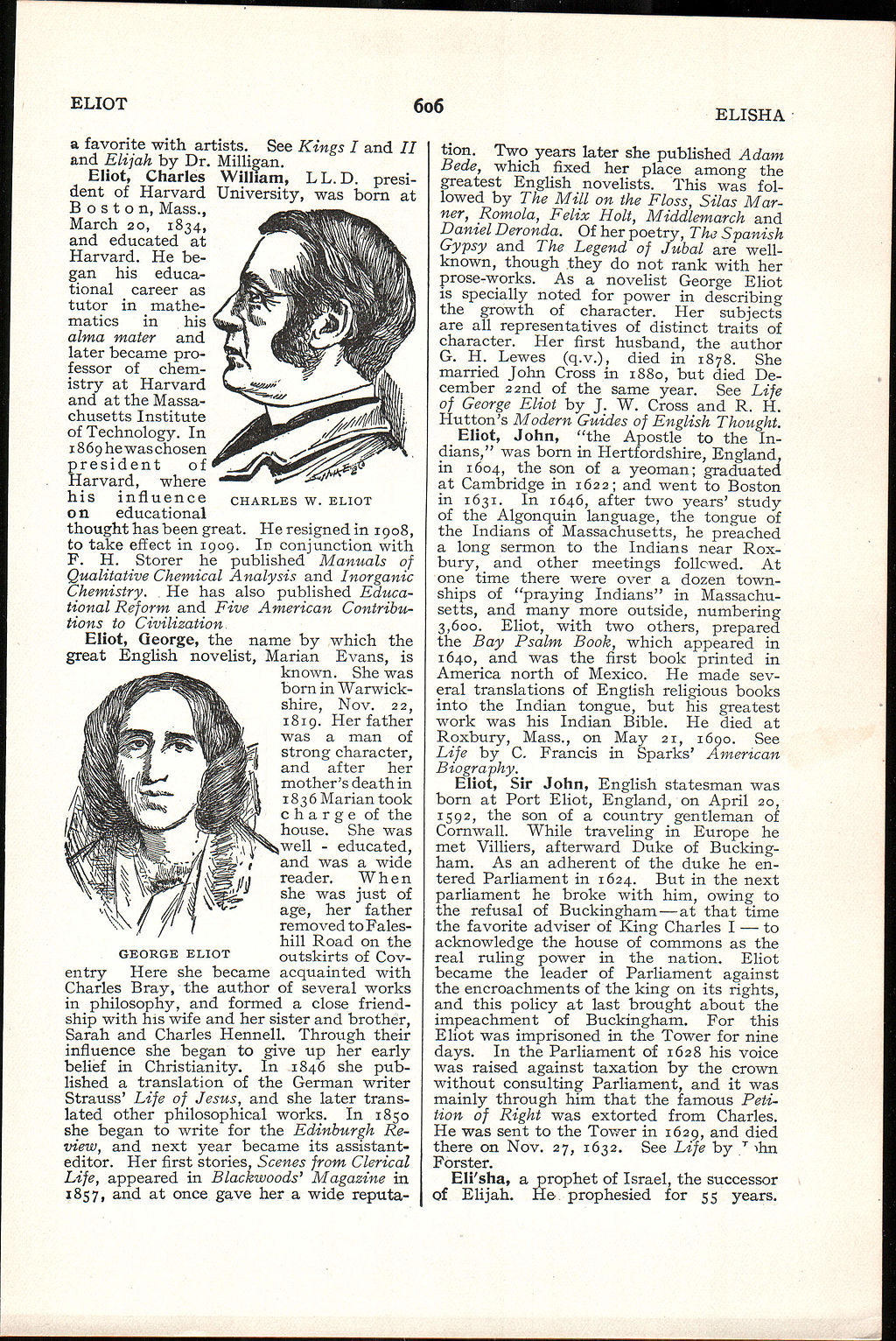a favorite with artists. See Kings I and II and Elijah by Dr. Milligan.

|
| CHARLES W. ELIOT |
Eliot, Charles William, LL.D. president of Harvard University, was born at Boston, Mass., March 20, 1834, and educated at Harvard. He began his educational career as tutor in mathematics in his alma mater and later became professor of chemistry at Harvard and at the Massachusetts Institute of Technology. In 1869 he was chosen president of Harvard, where his influence on educational thought has been great. He resigned in 1908, to take effect in 1909. In conjunction with F. H. Storer he published Manuals of Qualitative Chemical Analysis and Inorganic Chemistry. He has also published Educational Reform and Five American Contributions to Civilization.

|
| GEORGE ELIOT |
Eliot, George, the name by which the great English novelist, Marian Evans, is known. She was born in Warwickshire, Nov. 22, 1819. Her father was a man of strong character, and after her mother's death in 1836 Marian took charge of the house. She was well-educated, and was a wide reader. When she was just of age, her father removed to Faleshill Road on the outskirts of Coventry. Here she became acquainted with Charles Bray, the author of several works in philosophy, and formed a close friendship with his wife and her sister and brother, Sarah and Charles Hennell. Through their influence she began to give up her early belief in Christianity. In 1846 she published a translation of the German writer Strauss' Life of Jesus, and she later translated other philosophical works. In 1850 she began to write for the Edinburgh Review, and next year became its assistant-editor. Her first stories, Scenes from Clerical Life, appeared in Blackwoods' Magazine in 1857, and at once gave her a wide reputation. Two years later she published Adam Bede, which fixed her place among the greatest English novelists. This was followed by The Mill on the Floss, Silas Marner, Romola, Felix Holt, Middlemarch and Daniel Deronda. Of her poetry, The Spanish Gypsy and The Legend of Jubal are well-known, though they do not rank with her prose-works. As a novelist George Eliot is specially noted for power in describing the growth of character. Her subjects are all representatives of distinct traits of character. Her first husband, the author G. H. Lewes (q.v.), died in 1878. She married John Cross in 1880, but died December 22nd of the same year. See Life of George Eliot by J. W. Cross and R. H. Hutton's Modern Guides of English Thought.
Eliot, John, "the Apostle to the Indians," was born in Hertfordshire, England, in 1604, the son of a yeoman; graduated at Cambridge in 1622; and went to Boston in 1631. In 1646, after two years' study of the Algonquin language, the tongue of the Indians of Massachusetts, he preached a long sermon to the Indians near Roxbury, and other meetings followed. At one time there were over a dozen townships of "praying Indians" in Massachusetts, and many more outside, numbering 3,600. Eliot, with two others, prepared the Bay Psalm Book, which appeared in 1640, and was the first book printed in America north of Mexico. He made several translations of English religious books into the Indian tongue, but his greatest work was his Indian Bible. He died at Roxbury, Mass., on May 21, 1690. See Life by C. Francis in Sparks' American Biography.
Eliot, Sir John, English statesman was born at Port Eliot, England, on April 20, 1592, the son of a country gentleman of Cornwall. While traveling in Europe he met Villiers, afterward Duke of Buckingham. As an adherent of the duke he entered Parliament in 1624. But in the next parliament he broke with him, owing to the refusal of Buckingham—at that time the favorite adviser of King Charles I—to acknowledge the house of commons as the real ruling power in the nation. Eliot became the leader of Parliament against the encroachments of the king on its rights, and this policy at last brought about the impeachment of Buckingham. For this Eliot was imprisoned in the Tower for nine days. In the Parliament of 1628 his voice was raised against taxation by the crown without consulting Parliament, and it was mainly through him that the famous Petition of Right was extorted from Charles. He was sent to the Tower in 1629, and died there on Nov. 27, 1632. See Life by John Forster.
Eli'sha, a prophet of Israel, the successor of Elijah. He prophesied for 55 years.
